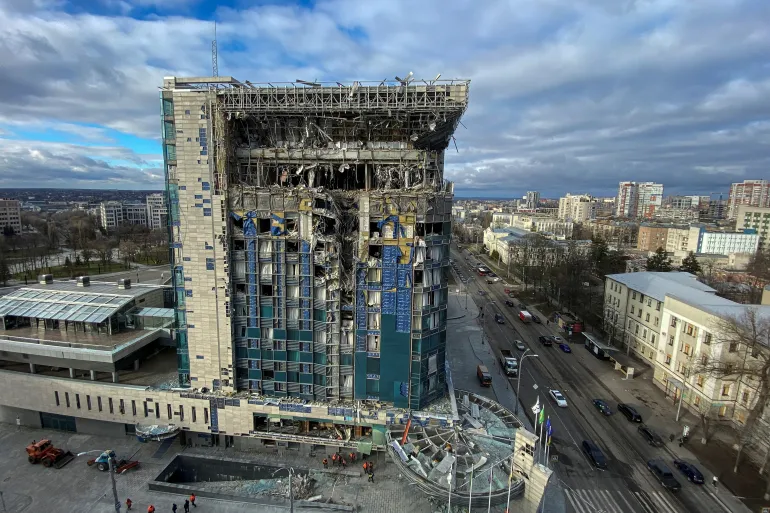The recent strike on the Russian city of Belgorod has set off a chain reaction of events, plunging the region into heightened tensions. This article aims to delve deeper into the aftermath of the Belgorod strike, exploring the international response, the evolving Russia-Ukraine conflict, and the accusations being hurled between nations.
The Aftermath Unveiled: Belgorod in the Aftermath of Ukrainian Strike
As photographic evidence surfaces on social media, courtesy of Russian independent outlet ASTRA, the world witnesses the haunting images of smoke rising from Belgorod. The city, situated near Ukraine’s northeastern city of Kharkiv, became the epicenter of a Ukrainian strike, prompting swift and severe repercussions.
Russia’s Allegations and the Toll on Belgorod
 Russia, quick to respond, accuses Ukraine of orchestrating an “indiscriminate combined strike” on Belgorod. The use of cluster munitions and Czech-made rockets is claimed, resulting in a grim toll – 24 fatalities and 108 injuries, according to Belgorod’s regional governor, Vyacheslav Gladkov. The severity of the strike raises questions about the nature of the conflict and the civilian cost.
Russia, quick to respond, accuses Ukraine of orchestrating an “indiscriminate combined strike” on Belgorod. The use of cluster munitions and Czech-made rockets is claimed, resulting in a grim toll – 24 fatalities and 108 injuries, according to Belgorod’s regional governor, Vyacheslav Gladkov. The severity of the strike raises questions about the nature of the conflict and the civilian cost.
Ukrainian Counteraction: More than a Response
In what appears to be a robust counteraction, Ukrainian sources reveal that over 70 drones were launched in response to what they term Russia’s “terrorist attacks on Ukrainian cities and civilians.” However, Kyiv maintains that their targets were strictly military infrastructure. The blame for civilian casualties is shifted towards the “incompetent work of Russian air defense,” unraveling a complex narrative of conflicting claims.
President Zelensky’s Report and the Wider Impact
Ukrainian President Volodymyr Zelensky, in a somber report, discloses the extent of the damage – 39 deaths and 159 injuries in the barrage that spanned “almost 120 cities and villages.” The sheer scale of the Ukrainian offensive raises concerns about the intensification of the conflict and its widespread impact on both military and civilian structures.
International Response and Diplomatic Standoff
 As the situation escalates, Moscow takes a bold step by calling a meeting of the United Nations Security Council. The accusations fly not only at Ukraine but also at the United States. Russia alleges direct involvement of British and American consultants in organizing what they term a “terrorist attack.” This, coupled with accusations against Washington and London for inciting Ukrainian authorities to commit “bloody crimes,” adds a layer of diplomatic complexity to the conflict.
As the situation escalates, Moscow takes a bold step by calling a meeting of the United Nations Security Council. The accusations fly not only at Ukraine but also at the United States. Russia alleges direct involvement of British and American consultants in organizing what they term a “terrorist attack.” This, coupled with accusations against Washington and London for inciting Ukrainian authorities to commit “bloody crimes,” adds a layer of diplomatic complexity to the conflict.
Czech Involvement and Diplomatic Standoff Unfolds
The Czech Republic finds itself entangled in the fallout as Russia questions its ammunition involvement. Moscow’s attempt to summon Czech representatives to a Security Council meeting in New York becomes a point of contention. Czech Foreign Minister Jan Lipavský dismisses the summons, further fueling the diplomatic standoff. The role of Czech equipment in Ukraine’s strike on Belgorod adds a new dimension to the already intricate narrative.
Conclusion:

The aftermath of the Belgorod strike paints a complex picture of a conflict escalating on multiple fronts. As accusations reverberate between nations, the toll on civilians and the diplomatic fallout underscore the urgency for a resolution. The world watches with bated breath as the Russia-Ukraine conflict takes yet another tumultuous turn, leaving a trail of destruction and diplomatic tension in its wake.







